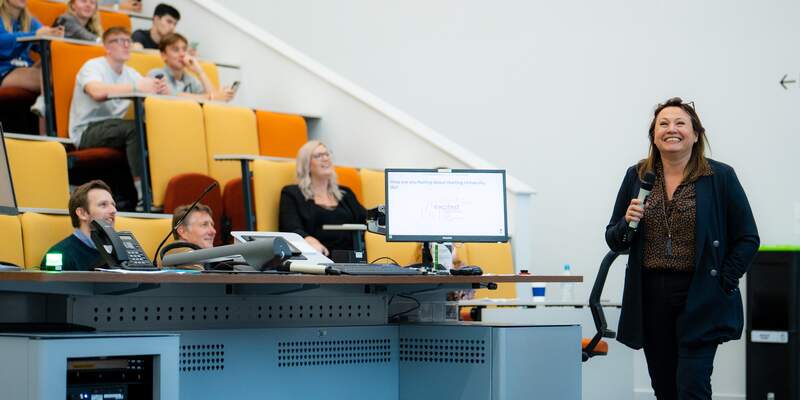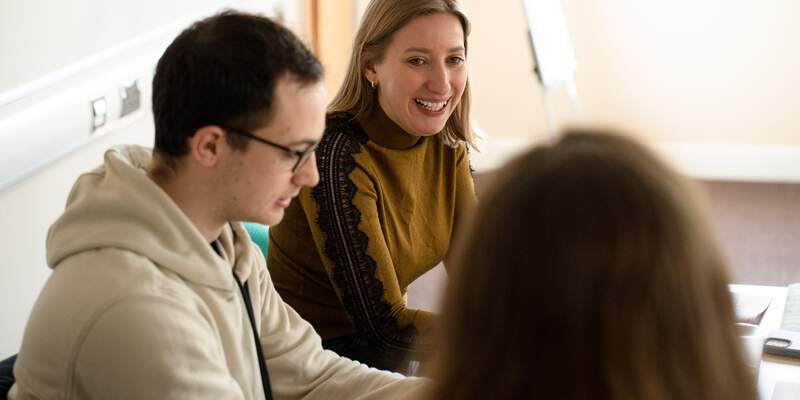View semester dates

BSc (Hons) Economics
Lay the foundation for a career with global impact
Year of entry: 2026/27
View semester dates
Economics is at play every day, in all areas of our lives.
Whether it’s the global implications of the Euro crisis, fluctuations in employment or even the price of milk in the supermarket, economics is the driving force.
Many of our lecturers are recognised for their ‘internationally excellent’ research into economics and its application to the real world. This research-led approach will give you a valuable insight into the ways in which financial decisions affect individuals, businesses and societies on a local and global level.

It's been a long journey, and I always emphasize that it started at York, where I learned so much of the economics I've used throughout my career.
Professor Daron Acemoğlu (BA Economics, 1989; Nobel Prize for Economic Sciences, 2024)
Course content
The first year of our economics courses introduce the key areas that underpin the rest of the course. Years 2 and 3 consolidate and expand upon this knowledge via a series of study modules which have been developed to give you a thorough understanding of the subject. They enable you to tailor your degree to meet your academic and career interests.
Year 1
The first year provides a broad introduction, covering everything from small-scale economic decisions at an individual and local level, through to issues that impact upon the national and international economy.
Core modules
Additionally, students with A-level Mathematics will also take Mathematics for Economists and Probability and Statistics as core modules. Students without A-level Mathematics will take Market Failure and Economic Policy and Quantitative Methods as core modules instead.
Option modules
You will also study one option module. In previous years, options have covered topics such as:
- Introduction to Finance
- Open/Elective modules
Elective modules
You may be able to replace one option module with an elective module, studying a complementary subject, a language or an interdisciplinary topic.
Academic integrity module
In addition to the above you will also need to complete our online Academic Integrity module.
Year 2
In the second year you will dig deeper in core economic topics and explore areas of your interest in greater detail.
Core modules
Option modules
You will also study three option modules. In previous years, options have covered topics such as:
Year 3
Core module
Option modules
You will also study five option modules from our wide range of specialist modules allowing you the flexibility to tailor the course to your future career path.
In previous years, options have covered topics such as:
- Applied Econometrics
- Bubbles, Panics and Crashes
- Commodities Markets and Derivative Securities
- Econometric Methods for Research
- Economics of Social Policy
- Financial and Time-Series Econometrics
- Game Theory
- Health Economics
- International Economic Growth and Development
- International Economics
- Information and Institution Design
- Labour Economics
- Macroeconomics: Topics in Theory for Policy
- Monetary Economics
- Political Economics
- Structure and Regulation of Financial Markets
- Economics Dissertation
Our modules may change to reflect the latest academic thinking and expertise of our staff, and in line with Department/School academic planning.
Learning outcomes
Every course at York has been designed to provide clear and ambitious learning outcomes. These learning outcomes give you an understanding of what you will be able to do at the end of the course. We develop each course by designing modules that grow your abilities towards the learning outcomes and help you to explain what you can offer to employers. Find out more about our approach to teaching and learning.
Learning outcomes for this course
- Identify issues and situations in society where economic concepts and principles can provide insight, and confidently apply those concepts and principles as appropriate.
- Apply flexibly the methods of logical and mathematical reasoning used by economists, including within formal models, with an understanding of the purpose and scope of such models.
- Independently locate, compile and present social, economic and financial data, with an understanding of the strengths and weaknesses of such data.
- Use proficiently statistical, econometric and computer-based techniques for analysing data, including in applying and testing economic models.
- Engage with, and draw on, academic and professional research in economics, with an ability to distinguish different themes within it, and to synthesise ideas from it.
- Recognise contemporary and historical economic episodes and phenomena, and confidently analyse their causes and significance.
- Analyse and critically evaluate economic and financial policies, of government and/or other institutions.
- Clearly present, explain and communicate their analysis, drawing on PLOs 1-7, in a variety of modes including verbal, written and technical.

In my time at York, I have never felt as if I was being taught a ‘textbook version’ of economics. Given the level of expertise each lecturer has in delivering their modules, and the breadth of choice, it was truly a unique learning experience.
Fees and funding
The fees and funding information here is for students starting in the 2026/27 academic year.
If you take a year abroad or year in industry you'll pay a reduced rate of fees for that year.
Annual tuition fees
| UK (home) | International and EU |
|---|---|
| £9,535 (TBC) | £27,500 |
The UK government has announced its intention to increase tuition fees from £9,535 to £9,790 for the 2026/27 academic year. We expect this to apply to new UK (home) undergraduate students starting their studies in September 2026.
UK (home) or international fees?
The level of fee that you will be asked to pay depends on whether you're classed as a UK (home) or international student. Check your fee status.
Fees for subsequent years
- UK (home) fees may increase within the government fee cap in subsequent academic years. We will notify you of any increase as soon as we can.
- International fees are subject to increase in subsequent years in line with the prevailing Consumer Price Index (CPI) inflation rate (up to a maximum of 10%).
More information
For more information about tuition fees, any reduced fees for study abroad and work placement years, scholarships, tuition fee loans, maintenance loans and living costs see undergraduate fees and funding.
Funding
We'll confirm more funding opportunities for students joining us in 2026/27 throughout the year.
- UK government loans
- UK scholarships and bursaries
- International scholarships
- Country-specific funding
- US loans
Nigel Thompson Memorial Scholarships
These scholarships are worth £3,000 each year to talented students from families of lower income.
York, Oxford, Cambridge, Imperial
Just four UK universities are rated Gold for teaching and top ten for research* in the latest national assessment exercises.
* Awarded joint 10th in the Times Higher Education ranking of the Research Excellence Framework 2021.
Teaching and assessment
You’ll study and learn with academics who are active researchers, experts in their field and have a passion for their subjects. Our approach to teaching will provide you with the knowledge, opportunities, and support you need to grow and succeed in a global workplace. Find out more about our approach to teaching and learning.
Teaching format
You will be encouraged to work creatively and independently but you won’t be on your own. Our expert tutors are available to offer guidance and support. Modules are taught via a series of lectures supported by discussion group seminars and practical classes. We place a strong focus on applying academic theory to real-life situations to improve planning, teamwork and research skills.
Our academics have links with industry and are knowledgeable about emerging developments in the sector, so you can be sure you will gain a well-informed account of the issues and challenges facing the field of economics. In addition, each module has its own area on the virtual learning environment that provides easy access to supporting learning materials.
Timetabled activities
In your first year, you can expect:
| Lectures | 8-9 hours per week |
|---|---|
| Seminars | 1-2 hours per week |
| Workshops | 0-2 hours per week |
| Practicals | 0-2 hours per week |
These figures are representative of a typical week. Your contact hours will vary throughout the year due to your module choices, non-compulsory classes, exam periods and changes to scheduled activities.
Outside your timetabled hours, you'll study independently. This may include preparation for classes, follow-up work, wider reading, practice completion of assessment tasks, or revision.
In the UK, full-time students are expected to spend 1,200 hours a year learning. That's about 40 hours of classes and independent study each week during semesters. Everyone learns at a different rate, so the number of hours you spend on independent study will be different to other students on your course.
Teaching location
You will be based in the Department of Economics and Related Studies on Campus West. Your teaching will take place in a variety of locations on Campus West.
About our campus
Our beautiful green campus offers a student-friendly setting in which to live and study, within easy reach of the action in the city centre. It's easy to get around - everything is within walking or pedalling distance, or you can use the fast and frequent bus service. Take a campus tour.
Assessment and feedback
Assessment varies from module to module and includes a combination of exams, written essays and project work.
Your tutors will give feedback in a variety of forms depending on the specific needs of the module. This may consist of written feedback, in-class discussion, model answers, one-to-one discussions or online responses.
Careers and skills
This flexible course has been developed to provide you with the skills to meet the needs of the business world. Whether you’re looking for a career in banking, finance, the public sector, an information organisation or in management consultancy, career prospects for graduates are excellent.
Following graduation around a third of our students go on to postgraduate study and many progress to an MSc here at York. The Department of Economics has one of the largest graduate schools in the country for training and research.
Career opportunities
In recent years graduates have gone on to work with:
- KPMG UK
- The World Food Programme
- Jaguar Land Rover
- HM Treasury
- PwC
- Nestlé
Transferable skills
Economics students graduate with a wide range of transferable skills. As well as developing your subject-specific knowledge, an economics degree will equip you with:
- Analytical thinking
- Empirical and interpretive skills
- Communication skills
- Problem-solving
I’d advise all students to get involved with student life. Aside from it being good for your employment prospects, it will also be a lot of fun. If you balance a serious society, like the debate club, with a more fun society, such as skydiving, you will mix with a wide variety of people and so you will be more adaptable in the future, this will certainly show up in interviews.
Entry requirements
| Qualification | Typical offer |
|---|---|
| A levels | AAB. A level Mathematics is a preferred subject, but not essential. If you do not have an A level in Mathematics then GCSE Mathematics Grade 7(A) is essential. |
| Access to Higher Education Diploma | 36 credits at Distinction and 9 at Merit or higher plus Level 3 units in Mathematics. If you do not have Level 3 Mathematics units then GCSE Mathematics Grade 7(A) is essential. |
| BTEC National Extended Diploma | DDD. A-Level Mathematics is a preferred subject, but not essential. If you do not have an A level in Mathematics then GCSE Mathematics Grade 7(A) is essential. We may also consider relevant units in your BTEC as A Level/GCSE Mathematics equivalent. |
| European Baccalaureate | 80% overall including 80% in Mathematics at either elementary or standard level |
| International Baccalaureate | 35 points, 5 in Higher Level Mathematics or 7 in Standard Level Mathematics (either Analysis and Approaches or Applications and Interpretations) is preferred, but not essential. If you do not have HL or SL Mathematics then MYP Mathematics Grade 6 or GCSE Mathematics Grade 7(A) is essential. |
| T levels | We consider a range of T Level qualifications, in combination with an A Level in Mathematics (or equivalent qualification). If you do not have an A level in Mathematics then GCSE Mathematics Grade 7(A) is essential. Please contact us to discuss your qualifications. |
| Scottish Highers / Advanced Highers | Advanced Highers - B in Mathematics plus Scottish Highers - BBBB OR AABBB in Scottish Highers including Mathematics We may also be able to consider three Advanced Highers or a combination of Highers and Advanced Highers, where an applicant does not meet the grade requirement through Highers alone. Please contact us to discuss your qualifications. |
| International foundation programme | Foundation Certificate from our International Pathway College or an appropriate alternative. |
| Other international qualifications | Equivalent qualifications from your country |
Alternative offers
Meeting the following additional criteria may qualify you for an alternative offer.
| Criteria | Adjustment |
|---|---|
| Widening participation | BBC. A-Level Mathematics is a preferred subject, but not essential. If you do not have an A level in Mathematics then GCSE Mathematics Grade 7(A) is essential. This is conditional upon successful completion of the WP programme including the YorJourney module (Black Access Programme, Next Step York) or successful completion of Realising Opportunities More about widening participation. |
| Contextual offer | BBB. A-Level Mathematics is a preferred subject, but not essential. If you do not have an A level in Mathematics then GCSE Mathematics Grade 7(A) is essential. |
| EPQ | If you achieve A or higher in the EPQ, you may be eligible for an alternative offer up to one A level grade (or equivalent) below our typical offer. |
English language
If English isn't your first language you may need to provide evidence of your English language ability. We accept the following qualifications:
| Qualification | Minimum requirement |
|---|---|
| IELTS (Academic) | 6.5, with a minimum of 6.0 in each component |
| IB English | A score of 4 in English A or 5 in English B (Higher Level or Standard Level) |
| Cambridge CEFR | 176, with a minimum of 169 in each component |
| Oxford ELLT | 7, with a minimum of 6 in each component |
| Oxford Test of English Advanced | 136, with a minimum of 126 in each component |
| Duolingo | Integrated subscores: 120 overall, with a minimum of 105 in each component |
| GCSE/IGCSE/O level English Language (as a first or second language) | Grade C / Grade 4 |
| LanguageCert SELT | B2 with a minimum score of 33/50 in each component |
| LanguageCert Academic | B2 with a minimum score of 33/50 in each component |
| Kaplan Test of English Language | 478 Main Flight score with 444 in each component |
| Skills for English | B2: Merit overall, with Pass with Merit in each component |
| PTE Academic | 61, with a minimum of 55 in each component |
| TOEFL | 87 overall, with a minimum of 21 in each component (taken before January 2026) 4.5 with 5 in Listening and 4.5 in each other component (taken after January 2026) |
| Trinity ISE III | Merit in all components |
| Other English language qualifications | We also accept other English Language qualifications, including various school-leaving certificates. |
For more information see our undergraduate English language requirements.
If you haven't met our English language requirements
You may be eligible for one of our pre-sessional English language courses. These courses will provide you with the level of English needed to meet the conditions of your offer.
The length of course you need to take depends on your current English language test scores and how much you need to improve to reach our English language requirements.
After you've accepted your offer to study at York, we'll confirm which pre-sessional course you should apply to via You@York.
Next steps
Discover York








